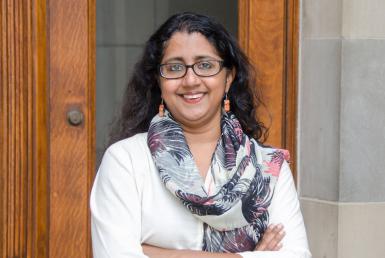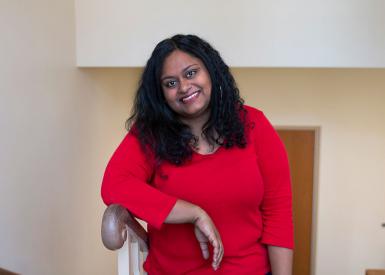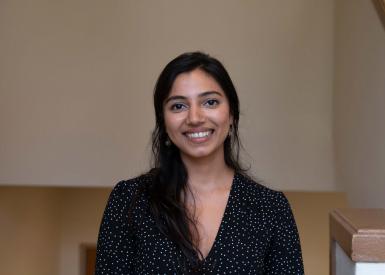Parameswaran to host virtual ICA preconference Thursday
As the coronavirus pandemic created a wave of canceled or modified events, professor Radhika Parameswaran knew she wanted the International Communication Association preconference she was organizing to continue in some way.

“It was a moment of ‘Do we hold this preconference virtually or do we cancel?’” she said. “But I don’t cancel.“
The scheduled in-person conference in Australia could no longer happen. As ICA shifted online, so did she and her primary co-organizers, associate professor Sangeet Kumar of Denison University and associate professor Kalyani Chadha of the University of Maryland.
Digital Cultures of South Asia will bring scholars whose research investigates digital culture in the South Asian region together via Zoom on Thursday. It precedes the 70th annual ICA conference, which is also online.
Parameswaran made a joke when she emailed the participants asking about going online: “Let it not be said that the South Asians, who are so prominent in technology, that we could not hold a conference virtually,” she said. “Especially when the theme is digital culture.”
However, the transition did present some hurdles. With 28 presenters from five different countries, time zones and internet access are two of the main challenges she and her primary co-organizers faced in the transition to an online format.
To help solve these issues, participants have the option to present live or to submit a video recording. Additionally, the sessions are now organized by time zone instead of thematically, which was the original plan.
Networking and personal interactions, though, are features of a preconference that cannot be moved online as naturally.
“I think what we have lost a little bit is what happens during breaks: the informal chats, the accidental interactions, the more one-on-one intimate exchanges,” Parameswaran said.
But there are also some advantages to an online format. The conference was originally scheduled to take place in Australia and was cost-prohibitive for some presenters. Some presentations were going to be submitted online because of that, so Parameswaran said the virtual format means that everyone will feel equally included.
“Now, we’re all left out,” she said. “None of us are going, so it feels like a level playing field for everyone.”

Doctoral candidate Pallavi Rao is helping Parameswaran with the format transition. She’s been learning about Zoom and its capabilities, and strategizing ways for participants to still chat with each other during the conference.
“We’re just trying to figure out an organization on Zoom that allows us to make sure everyone gets to talk, registered participants who may not be presenting can still be a part of the conversation and to try and make sure no one in our audience is left behind,” Rao said.
Rao has presented digitally at other conferences in the past and said she is confident that this digital preconference will be successful. Her presentation, “From Critics to Creators: Anti-caste Social Media Communities and English-Language News,” looks at the representation of members of marginalized caste group in the media.
“I’m just glad we’re still going through with it, because I feel like some aspects of my work still need some feedback,” she said. “It’s nice to have a deadline to work against, know that you have to have this written and presented at a certain time, so you can at least keep writing quickly and getting something out there.”

Digital Cultures of South Asia will be master’s candidate Mallika Khanna first conference presentation. Her presentation is called “‘Desiness’ in the Digital Age: Investigating Social Media as a Site for South Asian Diaspora Interpellation.”
“For me, it’ll be a nice way to dip my toe into doing conferences without having to worry too much,” she said.
She attended The Media School Graduate Association’s annual conference, Common Ground, which also moved online this year.
“A lot of people, I think, really felt like they were getting to do the same kind of thing, which is to speak to a community of scholars with similar interests as you,” Khanna said.
This community-building, including the opportunity to collaborate with Kumar and Chadha — both leading scholars in the field — is one of the main reasons Parameswaran said she was determined to have the preconference.
“We had people submitting from all these different parts of the world for the same reason: wanting to interact with scholars from other parts of the world,” she said.
While the preconference will look different than originally planned, it will still provide the opportunity for scholars to present their work and learn from their peers.
“I believe in seizing the moment, to be a community,” Parameswaran said. “I love being part of these communities.”
A livestream of the conference is available at youtu.be/mlJGdMDESQo.

